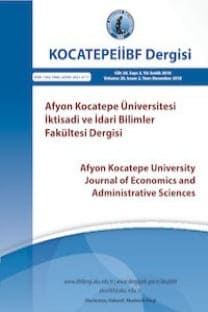STRATEJİK KARAR VERİCİLER OLARAK LİDERLERİN DUYGUSAL ZEKA YETERLİLİĞİ: TÜRK SİLAHLI KUVVETLERİNDE AMPİRİK BİR ÇALIŞMA
Stratejik Karar Verme, Duygusal Zeka, Askeri Liderlik
EMOTIONAL INTELLIGENCE ABILITY OF LEADERS AS STRATEGIC DECISION MAKERS: AN EMPIRICAL STUDY ON THE TURKISH MILITARY
___
- ABRAHAMS, D. S.: Emotional Intelligence and Army Leadership: Give it to me straight , Military Review, 3-4, 2007, pp.86-93.
- ACAR, T. F.: Duygusal Zeka Yeteneklerinin Göreve Yonelik ve İnsana Yönelik Liderlik Davranışları ile Ilişkisi: Banka Şube Müdürleri Üzerine Bir Alan Araştırması (Unpublished doctoral dissertation), Istanbul Universitesi, Istanbul, 2001.
- ARIKAN, M.: Askeri Liderlik Yardımcı Kitabı, Kara Harp Okulu, Ankara, 2001.
- ATKINSON, R. L.: Psikolojiye Giriş, Sosyal Yayınlar, Istanbul, 1995.
- BERBEROGLU M. S., DEMIRAY C.: Askeri Liderlik Ders Kitabı, KHO Matbaası, Ankara, 2002.
- BHUSHAN N., RAI K.: Strategic Decision Making: Applying the Analytic Hierarchy Process, Springer, USA, 2004.
- CACIOPPE, R.: Leadership Moment By Moment , Leadership and Organization Development Journal, 18 (7), 1997, pp.335- 345.
- CERTO, S. C.: Principles of Modern Management: Functions And Systems, Allyn & Bacon, Boston, 1989.
- DULEWICZ V., HIGGS M.: Can Emotional Intelligence Be Developed?, International Journal of Human Resource Management, 15 (1), 2004, pp.95-111.
- FRED A., MANSKE, J. R.: Etkili Liderliğin Sırları, T.C. KKK. Kara Harp Okul Komutanlığı, Ankara, 1994.
- GOLEMAN, D., CHERNISS C.: The Emotionally Intelligence Workplace, Jossey-Bass Publishing, USA, 2001.
- GUILLOT, W. M.: Strategic Leadership: Defining the Challenge, Air Power Journal, 2, 1, 2005, pp.113-128.
- HELLRIEGEL D., SLOCUM J.W.: Organizational Behavior, South- Western College Publishers, USA, 2006.
- IOANNOU A. C., PANAGIOTOPOULOS P., STERGIOULAS L.: Roadmapping as a Collaborative Strategic Decision-Making Process, World Academy of Science, Engineering and Technology, 54, 2009, pp.770-776.
- KHOSROWSHAHI F., HOWES R.: A Framework For Strategic Decision-Making Based on A Hybrid Decision Support Tools, ITcon, 10, 2005, pp.111-124.
- LOPES P. N. et al.: Emotional Intelligence and Social Interaction, Personality and Social Psychology Bulletin, 30, 8, 2004, pp.1018-1034.
- LOPES P. N. et al.: Evidence that emotional intelligence is related to job performance and affect and attidudes at work, Psicothema, 18, 2006, pp.132-138.
- MATTHEWS G., ZEIDNER M., ROBERTS D.R.: Emotional Intelligence, Science and Myth, The MIT Press, England, 2002.
- PAPADAKIS V.M., BARWISE P. How Much do CEOs and Top Managers Matter in Strategic Decision-Making?, British Journal of Management, Vol:13, 2002, pp.83-95.
- POLATCAN, I.: TSK İç Hizmet Kanun ve Yönetmeliği, Personel Kanunu, Bayrak Yayıncılık, İstanbul, 2000.
- RATNESAR R.: Teaching feelings 101, Time, 150 (9), 1997, p.62.
- RYBACK, D.: Putting Emotional Intelligence to work, Butterworth- Heinemann, USA, 1998.
- SCHACHTER, D.: Developing and Applying Emotional Intelligence. Information Outlook, 13(5), 2009.pp.49-50.
- SEWELL, G. F.: Emotional Intelligence And The Army Leadership Requirements Model. Military Review, 11-12, 2009, pp.93- 98.
- SEGAL J., JAFFE J.: The Language of Emotional Intelligence, McGraw Hill, USA, 2008.
- SINGH, D.: Emotional Intelligence At Work: A Professional Guide, Response Books, India, 2006.
- STEIN, S., BOOK E. H.: The EQ Edge: Emotional Intelligence And Your Success, John Wiley and Sons, Canada, 2006.
- TOPUZ, H.: The Relationship Between Leadership And Emotional Intelligence: A Proposed Development Model For Enhancing Leadership Qualities Among The Officers In The Turkish Navy. (Unpublished master dissertation). Turkish Naval Academy, Istanbul, 2005.
- USEEM, M., COOK J., SUTTON L.: Developing Leaders for Decision Making Under Stress, Academy of Management Learning and Education, 4, 4, 2005, pp.461-485.
- WALL B.: Coaching For Emotional Intelligence, Amacom, USA, 2007.
- ISSN: 1302-1966
- Yayın Aralığı: 2
- Başlangıç: 1999
- Yayıncı: Afyon Kocatepe Üniversitesi İktisadi ve İdari Bilimler Fakültesi Dekanlığı
İŞSİZLİK ve ENFLASYON ORANLARI ARASINDAKİ NEDENSELLİK İLİŞKİSİ: G8 ÜLKELERİ ÖRNEĞİ
Bülent ALTAY, , Can Tansel TUĞCU, Mert TOPCU
THE TURKISH-RUSSIAN RELATIONS IN THE ERA OF AKP
Mohamad ARAFAT, . ., Mahmood ALNUAİMY
Meltem ONAY, , Hasan DİNÇER, Ali GÜRSOY
LİSANÜSTÜ ÖĞRENİMDE DERS SEÇİMİNE YÖNELİK BİR MODEL ÖNERİSİ
Filiz ERSÖZ, , Mehmet KABAK, Zafer YILMAZ
YÖNETİMLERARASI İŞBİRLİĞİNİN KENTSEL YAŞAM KALİTESİNİN GELİŞTİRİLMESİNDEKİ ÖNEMİ
İsmail BAŞARAN, , Salih ÇİFTÇİ
Handan ÖZDEMİR AKBAY, Elif AKAGÜN ERGİN,
MOBBING VE ÖRGÜTSEL SİNİZM ARASINDAKİ İLİŞKİLER: HEMŞİRELER ÜZERİNDE BİR UYGULAMA
FAKTORİNG ŞİRKETİ VE SATICI İŞLETME AÇISINDAN FAKTORİNG İŞLEMLERİNİN MUHASEBELEŞTİRİLMESİ
